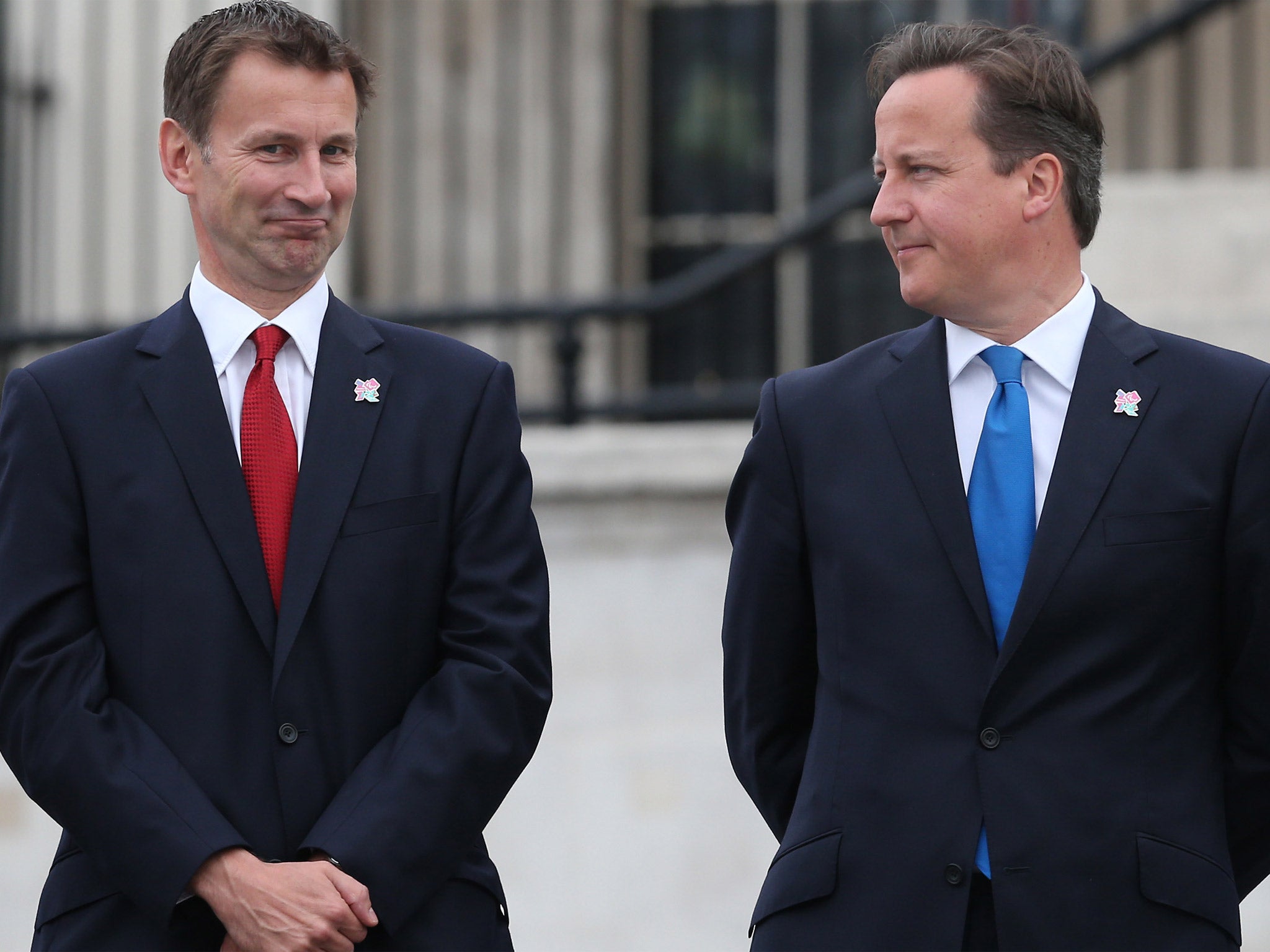Inside Whitehall: Cameron and Hunt know the next leader of NHS England could cost them an election
These decisions should have been ones for NHS England. Mr Hunt should not have been involved

It is the most important appointment this side of the election that David Cameron doesn't have the power to make. Over the next few months, a supposedly independent panel will choose a candidate to succeed Sir David Nicholson running the NHS. Whoever gets the job will have a budget of nearly £100bn, day-to-day responsibility for overseeing healthcare in England and possibly more influence than most Cabinet ministers in determining whether the Conservatives win or lose the next election.
It is little wonder that behind the scenes Mr Cameron and the Health Secretary Jeremy Hunt are showing “an unhealthy interest” in who is appointed to be the new Chief Executive of NHS England. “The word has come down from Downing Street that they want a Carney and not an NHS placeman,” said one source, referring to the eye-catching appointment of Canadian central banker Mark Carney as Governor of the Bank of England. “But what they seem to be forgetting is there are lots of central banks to choose from but no organisation in the world is remotely like the NHS.”
Another put it more bluntly: “Most people who'd be qualified to do the job would look at it and think 'You must be joking'. Your in-tray is a looming financial crisis, politicians breathing down your neck and an organisation that hasn't found its feet. I suspect that will make a lot of potential candidates think twice.”
And therein lies the rub. Because whoever the next boss of NHS England is will be leading an organisation far removed from the one first envisaged by the former Health Secretary Andrew Lansley when he drew up his controversial Health and Social Care Bill. His (much misinterpreted) vision was of an NHS free from endless political interference. Ministers would set out the broad direction for the NHS through a “mandate” and then let NHS England get on and deliver it.
NHS England alone would decide where the money was spent, which services merged, closed or expanded and then be held accountable to Parliament for their success or failure. It would be free to concentrate on long term health improvements – such as improving life expectancy and tackling chronic illness – and be free from “political initiative-itis” to respond to the latest headlines. But then Mr Lansley was sacked and in his place came Mr Hunt who, according to one impartial observer, “gives the distinct impression that he has either not read the Health and Social Care Act or has chosen deliberately to ignore it”.
For better or for worse, the current Health Secretary believes the NHS is electorally too important to be left to NHS England and has set about re-asserting political control over it. Take just two examples. In August he announced the NHS would give £500m to A&E departments to try to offset a winter crisis and earlier this month he set aside a further £50m to roll out seven-day access to GPs.
But under the new system these decisions (and announcements) should have been ones for NHS England. Mr Hunt should not really have been involved at all.
Then in September Mr Hunt announced that the “capability” of 11 NHS Trust chief executives would be reviewed and “changes to the management would be made if necessary to ensure that the leadership is best placed to drive the required improvements to the quality of services”. But again, interestingly, six of these hospitals have “foundation” status so should really be free from political interference in deciding whether to hire or fire their chief executive. There are countless other examples. But what is clear is that Mr Hunt sees his role not as a “hands off” setter of NHS aspiration but as a “hands on” enforcer.
None of this is wrong, necessarily – but it makes a mockery of the supposed independence of NHS England. And at a time when the Health Service is facing massive financial strain, the lines of accountability and responsibility need to be clear and unambiguous. The new chief executive will have to address this urgently. They will have to decide whether to stand up to the politicians and re-assert NHS England's independence – as was originally envisaged – or allow the organisation to continue as the operational arm of the Department of Health. No wonder Mr Cameron and Mr Hunt are so concerned about who gets the job.
Simon Stevens
A former health adviser to Alan Milburn and Tony Blair, Mr Stevens is currently vice-president at UnitedHealth, the huge US private healthcare provider. He is thought to be the favourite for the position but he is married to an American woman and currently earns far more than the £200,000 salary on offer here.
Mark Britnell
Another former senior NHS manager, Mr Britnell is currently global head of health for the accountant KPMG. He is thought to want the job but has a reputation as a divisive figure which might count against him given its political sensitivies.
Sir Bruce Keogh
Sir Bruce, a former heart surgeon, is the current medical director at NHS England and the go-to man for politically sensitive jobs such as the review of failing hospitals in the wake of the Mid Staffordshire scandal. However, he has no commissioning experience.
Bernard Tyson
Mr Tyson is the chief executive of Kaiser Permanente, a not-for-profit company based in California that offers affordable healthcare to nine million Americans. He would be the wild-card choice – but has only been in his current job since June and might be reluctant to move across the Atlantic.
Join our commenting forum
Join thought-provoking conversations, follow other Independent readers and see their replies
Comments
Bookmark popover
Removed from bookmarks